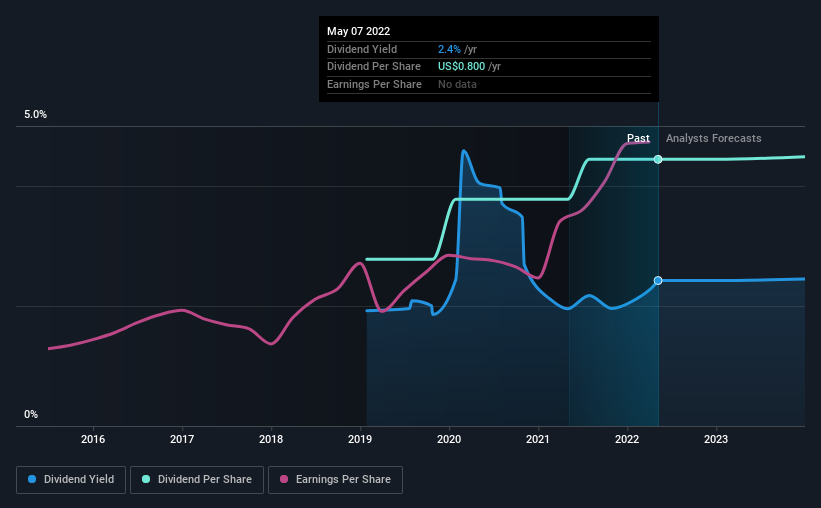Should You Buy Veritex Holdings, Inc. (NASDAQ:VBTX) For Its Upcoming Dividend?
Regular readers will know that we love our dividends at Simply Wall St, which is why it's exciting to see Veritex Holdings, Inc. (NASDAQ:VBTX) is about to trade ex-dividend in the next 3 days. Typically, the ex-dividend date is one business day before the record date which is the date on which a company determines the shareholders eligible to receive a dividend. The ex-dividend date is an important date to be aware of as any purchase of the stock made on or after this date might mean a late settlement that doesn't show on the record date. Accordingly, Veritex Holdings investors that purchase the stock on or after the 12th of May will not receive the dividend, which will be paid on the 27th of May.
The company's next dividend payment will be US$0.20 per share, and in the last 12 months, the company paid a total of US$0.80 per share. Looking at the last 12 months of distributions, Veritex Holdings has a trailing yield of approximately 2.4% on its current stock price of $33. Dividends are a major contributor to investment returns for long term holders, but only if the dividend continues to be paid. We need to see whether the dividend is covered by earnings and if it's growing.
See our latest analysis for Veritex Holdings
If a company pays out more in dividends than it earned, then the dividend might become unsustainable - hardly an ideal situation. Veritex Holdings paid out a comfortable 28% of its profit last year.
Companies that pay out less in dividends than they earn in profits generally have more sustainable dividends. The lower the payout ratio, the more wiggle room the business has before it could be forced to cut the dividend.
Click here to see the company's payout ratio, plus analyst estimates of its future dividends.
Have Earnings And Dividends Been Growing?
Stocks in companies that generate sustainable earnings growth often make the best dividend prospects, as it is easier to lift the dividend when earnings are rising. If earnings fall far enough, the company could be forced to cut its dividend. For this reason, we're glad to see Veritex Holdings's earnings per share have risen 18% per annum over the last five years.
Many investors will assess a company's dividend performance by evaluating how much the dividend payments have changed over time. Since the start of our data, three years ago, Veritex Holdings has lifted its dividend by approximately 17% a year on average. It's great to see earnings per share growing rapidly over several years, and dividends per share growing right along with it.
The Bottom Line
Is Veritex Holdings worth buying for its dividend? Companies like Veritex Holdings that are growing rapidly and paying out a low fraction of earnings, are usually reinvesting heavily in their business. This strategy can add significant value to shareholders over the long term - as long as it's done without issuing too many new shares. We think this is a pretty attractive combination, and would be interested in investigating Veritex Holdings more closely.
On that note, you'll want to research what risks Veritex Holdings is facing. In terms of investment risks, we've identified 3 warning signs with Veritex Holdings and understanding them should be part of your investment process.
If you're in the market for strong dividend payers, we recommend checking our selection of top dividend stocks.
Have feedback on this article? Concerned about the content? Get in touch with us directly. Alternatively, email editorial-team (at) simplywallst.com.
This article by Simply Wall St is general in nature. We provide commentary based on historical data and analyst forecasts only using an unbiased methodology and our articles are not intended to be financial advice. It does not constitute a recommendation to buy or sell any stock, and does not take account of your objectives, or your financial situation. We aim to bring you long-term focused analysis driven by fundamental data. Note that our analysis may not factor in the latest price-sensitive company announcements or qualitative material. Simply Wall St has no position in any stocks mentioned.

